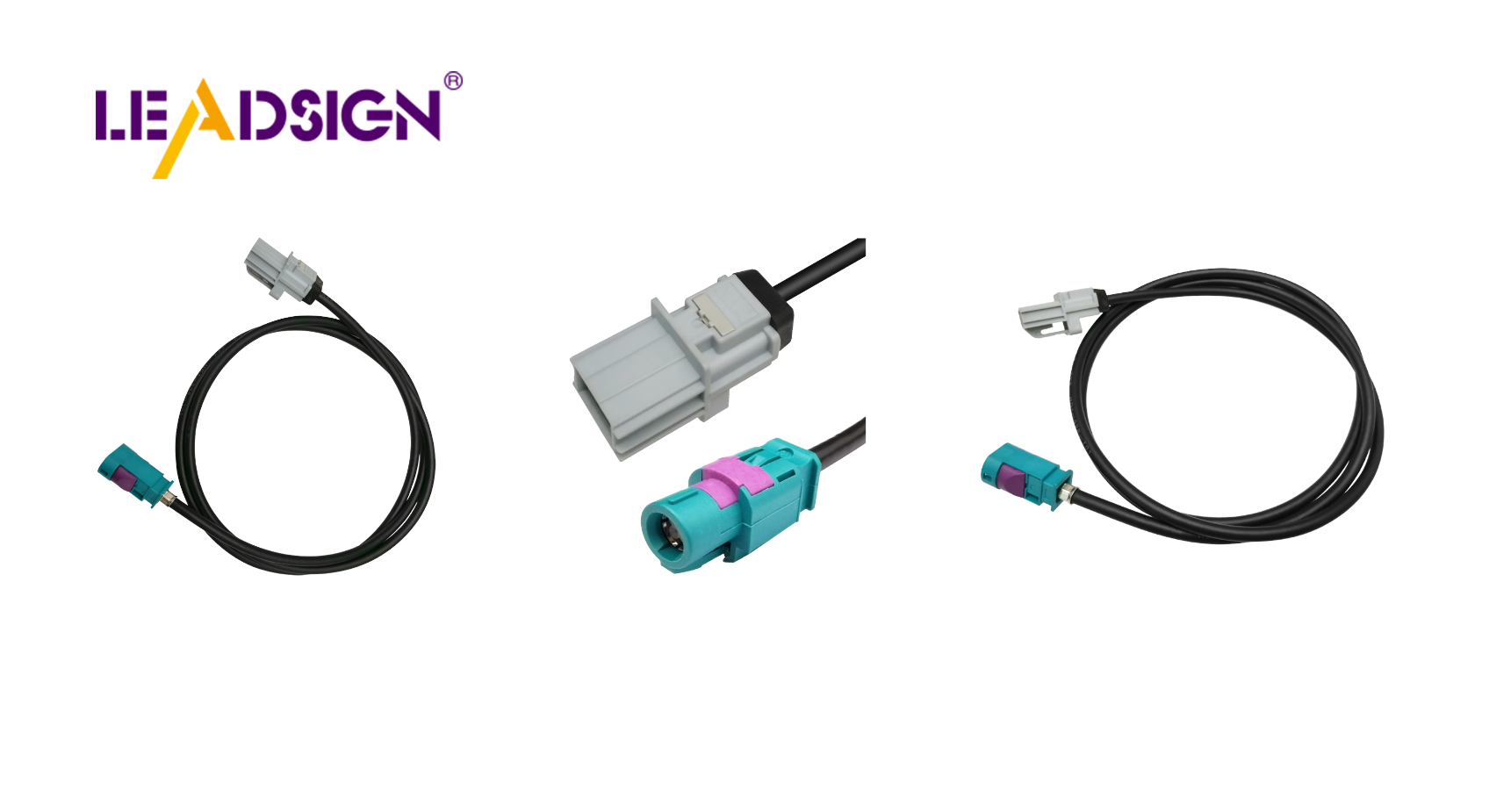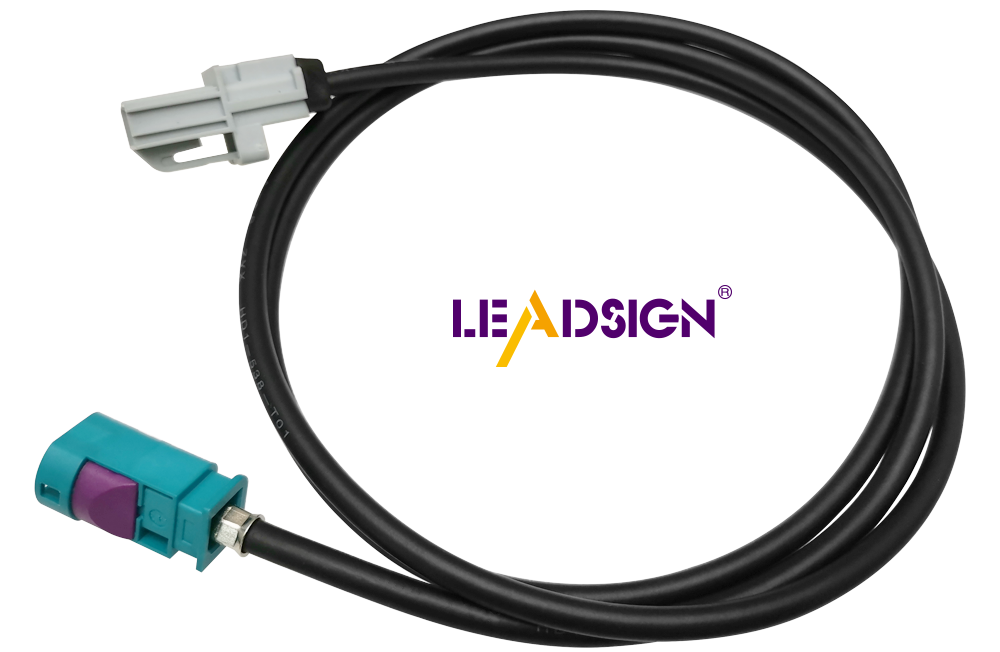What Are the Key Types of Automotive Plugs and Connectors

What are the main types of vehicle connectors and connectors? These important parts connect different electronic systems in your car. They help with steady power and signal flow. You will find several main types of connectors in cars:
Wire-to-Wire Connectors: These join single wires, allowing easy wiring.
Board-to-Board Connectors: More common as cars have more electronics now.
Terminals: Like ring and spade terminals, these link wires to parts or other wires.
Each type is key for keeping your car's electrical systems stable and reliable.
Key Takeaways
Understand the different types of vehicle connectors, such as wire-to-wire, board-to-board, and multi-pin connectors, to ensure reliable electrical systems in your car.
Choose blade connectors for their versatility and ease of use, making them ideal for various automotive and household applications.
Utilize weatherproof connectors to protect your vehicle's wiring from harsh environmental conditions, ensuring longevity and performance.
Select high-temperature connectors for areas exposed to extreme heat, such as near exhaust systems, to maintain secure connections.
Always consider the specific application and environment when selecting connectors to ensure they meet the necessary durability and performance standards.
Check for compliance with industry standards like ISO and SAE to guarantee that the connectors are tested for quality and reliability.
Regularly inspect and maintain your vehicle's connectors to prevent electrical issues and enhance overall safety.
Common Types of Vehicle Connectors

Blade Connectors
Blade connectors, also called spade connectors, are important in car wiring. They have a flat metal piece that fits into a matching slot.
Features and Benefits
Versatility: Blade connectors come in many shapes and sizes for different uses.
Ease of Use: You can easily plug them in or out, making fixes simple.
Secure Connection: Their design keeps connections strong, even with shaking.
Typical Applications
Automotive Wiring: Blade connectors join wires in car systems.
Household Appliances: They connect wires in home gadgets too.
Industrial Equipment: Used in machines for quick electrical links.
Ring and Spade Terminals
Ring and spade terminals are key parts in vehicle connectors. They make sure wires stay connected to parts.
Features and Benefits
Durability: These terminals last long even in tough conditions.
Variety: Different sizes fit various wire thicknesses and uses.
Ease of Installation: Attaching them to wires is fast and easy.
Typical Applications
Battery Connections: Ring terminals link wires to battery ends.
Grounding: Spade terminals work well for grounding in cars.
Electrical Panels: Both types secure connections in panels.
Bullet Connectors
Bullet connectors are another kind of vehicle connector. They are known for their special shape and use.
Features and Benefits
Compact Design: Bullet connectors are small, good for tight spots.
Quick Connection: Easy to attach or remove, great for short-term links.
Reliable Performance: They stay connected well, avoiding slips.
Typical Applications
Automotive Lighting: Bullet connectors often link lights in cars.
Motorcycles: Popular for motorcycle wiring due to size.
Marine Applications: Good for boats, staying connected when wet.
Multi-Pin Connectors
Multi-pin connectors are important in today's cars. They let many wires connect at once, which is great for complex car electronics.
Features and Benefits
High Capacity: These connectors link lots of wires together. This makes them perfect for complicated wiring.
Secure Locking Mechanism: They have locks to keep connections steady. This helps even when the car shakes a lot.
Versatile Design: You can find them in different styles. They work well for both power and signals.
Ease of Maintenance: Their neat setup makes fixing easy. You can spot and change bad connections quickly.
Typical Applications
Engine Control Units (ECUs): They join sensors and parts to the ECU. This is key for running the engine right.
Infotainment Systems: These connectors handle wires for music, video, and maps.
Safety Systems: Airbags and brakes use these connectors to talk to each other safely.
Lighting Systems: They help lights work together across the car.
Multi-pin connectors are a must-have in modern cars. They help advanced systems run smoothly, keeping your car safe and efficient.
Special Vehicle Connectors
Weatherproof Connectors
Weatherproof connectors keep your car's wires safe from bad weather. They stop water, dust, and dirt from getting in. This helps the car work well in rain or snow.
Environmental Protection
These connectors are great at blocking out water and dust. They have seals that keep everything dry inside. This way, your car's wires stay safe even when it's stormy outside. Using these connectors stops rust and damage from wetness.
Common Uses
You see weatherproof connectors in many car parts:
Outside Lights: Used in headlights and taillights to work well in rain.
Engine Area: They protect important engine parts from getting dirty.
Off-Road Cars: These connectors help keep wires connected in mud.
High-Temperature Connectors
High-temperature connectors handle heat from hot car parts. They make sure wires stay connected even when it's very hot.
Strong Materials
These connectors use materials that don't melt easily. They are made of special plastics and metals that can take the heat. This keeps your car's wires working safely.
Usual Places Found
High-temperature connectors are used where it gets really hot:
Exhaust Parts: Found near exhaust pipes where it’s super hot.
Engine Space: Keep connections strong near the engine heat.
Turbo Engines: Good for cars with turbo engines because they get extra hot.
Picking the right special connectors makes your car's wires last longer. It helps them work well no matter what the weather is like.
Industry Rules and Thoughts for Vehicle Connectors
What They're Made Of
When picking vehicle connectors, think about what they're made from. The materials are important for how long they last and work in tough car conditions.
Common Stuff Used
Thermoplastics: These are used a lot because they don't melt easily. They keep the inside parts safe from damage.
Metals: Metals like copper and aluminum help electricity flow well. This is key for keeping connections strong.
Silicone: Silicone seals stop water and dust from getting in, keeping the connector working even when it's wet outside.
Good Things About Different Materials
Thermoplastics: They're light and don't rust, good for cars where weight matters.
Metals: Metals make sure electricity moves well, which is needed to keep things connected right in cars.
Silicone: Silicone seals protect against water and dust, making connectors last longer.
Handling Tough Conditions
Car connectors need to deal with hard stuff to keep the car's electric systems safe.
Why It Matters in Cars
Car connectors face hot and cold, shaking, wetness, and chemicals. You need ones that can handle this to work well. For example, Deutsch HD30 Series Connectors keep out dirt and water.
Rules to Think About
When choosing connectors, look at rules that check quality:
RoHS Compliance: This rule limits bad stuff in electronics so they're safe for people and nature.
Durability Tests: Find connectors tested for heat, salt spray, and rust resistance. These tests show they'll work well even when it's tough outside.
By knowing what vehicle connectors are made of and how they handle tough conditions, you can choose ones that make your car's electric systems safer and better.
Picking the Right Car Connector
Choosing the right car connector is very important. It keeps your car's electric systems safe and working well. You need to think about a few things to choose wisely.
Things to Think About
What It's For
First, know what you need it for. Different parts of your car need different connectors. For example, connectors for music systems are not like those for engines. Knowing how much power and signals they carry helps pick the right one.
Where It Will Be Used
Next, think about where the connector will be used. Some places are hot or wet, so connectors must handle that. Weatherproof ones are good outside, while heat-proof ones work near engines.
How to Choose
Matching Connectors to Jobs
To match connectors to jobs, check each one's details. Look at how many pins it has and if it locks in place. Multi-pin ones are great for complicated setups needing many links.
Making Sure They Fit
Making sure they fit with your car is key. Check if they meet rules like ISO and SAE standards. These rules mean they can handle today's cars well. Following standards like USCAR 2 means they've been tested toughly.
By thinking about these things, you can pick connectors that make your car's electric parts better and safer.
There are many types of car connectors. Some are blade and bullet connectors. Others are special, like weatherproof and high-temperature ones. Each type is important for your car's electrical systems to work well. Picking the right connector is very important. Think about what you need it for and where it will be used. Always choose connectors that lock well and follow rules like ISO or SAE standards. This helps keep your car safe and working properly.
See Also
Why Fakra Connectors Matter For Today's Vehicles
Significance of FAKRA Connectors in Car Technology
Fakra Connectors: Essential Components in Automotive Design

